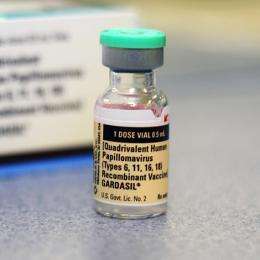Vaccine protects against more HPV variants than previously known

The human papillomavirus (HPV) can cause cancer and many countries run national vaccination programs to minimize the risk. Studies involving researchers at German Cancer Research Center, Karolinska Institutet and Tampere University now report on the longitudinal effect of common HPV vaccines. The results, which are published in The Journal of Infectious Diseases and Lancet Infectious Diseases, show lasting protection against more HPV variants than the vaccines were developed for.
Human papillomavirus (HPV) is a common and highly infectious sexually transmitted disease. While in most cases, the HPV infection heals on its own, it can become chronic and cause various kinds of cancer.
The HPV group comprises over 200 types of virus, thirteen of which are classified as high-risk causes of cancer. For example, HPV types 16 and 18 cause around 70 percent of all cases of cervical cancer; HPV types 6 and 11 cause benign genital warts.
Today, bivalent (comprising HPV types 16 and 18) and quadrivalent (comprising HPV types 6, 11, 16 and 18) vaccines are used against HPV around the world, with different reported efficacy.
Cross-protecting antibody responses
As a measure of a vaccinated individual’s protection against tumors caused by HPV infection, use of serum antibodies to different types of HPV is desired. However, researchers have not yet defined which antibody levels provide full and lasting protection, or whether vaccines for certain HPV types also protect other types than those the vaccine is intended for (cross-protection).
In two studies, researchers at several institutions including German Cancer Research Centre (DKFZ) in Heidelberg, Karolinska Institutet and Tampere University in Finland have made independent comparisons of directly and cross-protecting antibody responses, including antibodies that protect against both vaccine HPV types and HPV types not covered by different national vaccine programs.
The researchers have assessed the sustainability of the antibody protection for bivalent and quadrivalent vaccines up to 12 years. The results are based on over 3,000 women in Finland who were 16-17 when they were vaccinated in 2002 and 2004.
Retrieval of serum samples collected and stored over 12 years was done from the Finnish Maternity Cohort Biobank. The serological analyses included antibodies to 16 different HPV types.
Gave long-term protection
The results show that the women who received the quadrivalent vaccine had antibodies to HPV types 6/11/16/18 for up to 12 years. Those who received the bivalent vaccine had antibodies to HPV types 16/18 for equally as long.
In the women who had received the bivalent vaccine, both the neutralizing and binding ability of the vaccine-induced antibodies to HPV16/18/31 were significantly higher than in those women who had received the quadrivalent vaccine. Neutralizing refers to the virus being prevented from entering host cells.
Source: Read Full Article
